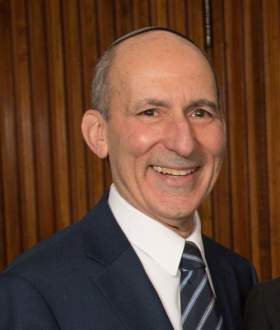
“Like a Tree Planted By Waters...It Does Not Cease to Yield Fruit” (Jeremiah 17:8)
A Talmudic sage suggests reading each week’s Torah portion twice in Hebrew and once in (Aramaic) translation. In that spirit, I look forward – when not sheltering in place – to perusing the coming week’s Torah reading each shabbat afternoon, after its opening verses are publicly read as part of the afternoon (minchah) service. Lately, between daylight savings time and spending the entire shabbat at home, I have added a look at the coming week’s haftarah, the selection from the prophets associated with the weekly Torah reading, to my late Saturday afternoon preview list.
In the weekly cycle of Torah study, this week marks the close of the Book of Leviticus. Toward the end of the book, Moses exhorts the Israelites to remain faithful to the covenant. The haftarah is a passage from the prophet Jeremiah focused on the same theme. It is in that connection that Jeremiah describes the person who is as “a tree planted by waters, sending forth its shoots by a stream: it does not sense the coming of heat, its leaves are ever-fresh; it has no care in a year of drought, it does not cease to yield fruit.”
Reading afresh the text of Jeremiah evoked memories of studying various selections of the prophets of Israel with some outstanding teachers. Along the line, I enjoyed the great gift of studying chapters of the prophets with Dr. David Lieber z”l, a master teacher, scholar and gentleman, who left a profound impact on the people whose lives he touched (an influence not always exercised, in their time, by the prophets whose words he unpacked). In his later years, Dr. Lieber edited a volume of commentary on the Torah and haftarot used in many synagogues, today.
My re-reading of this week’s selection from Jeremiah – while seated at home – inspired me to revisit a book I had purchased at Dr. Lieber’s suggestion, The Relevance of the Prophets, by R.B.Y. Scott. The author, a Protestant minister who served as Professor of Religion at Princeton, describes the relevance of the prophets in the following terms: “They are the contemporaries of every generation because the truth they declare is permanently valid.” They remind us “that religion is not a specialized activity of man’s life, but a quality and attitude in all his activities, a total way of living….”
The verse in Jeremiah that particularly attracted my attention develops the imagery of a tree nourished by the waters of a stream; it is ever able to yield fruit. The metaphor of water or a stream is often used with reference to Torah. Jeremiah’s words are reminiscent of a sentence in the first psalm that describes a person grounded in Torah as “a tree planted by streams of water, that brings forth its fruit in its season, and whose leaf does not wither… (Psalms 1:3).” Jeremiah, as the psalmist, indicates that those nourished by Torah will yield fruit that can be shared with others.
As R.B.Y. Scott observes, the words of the prophets are forever contemporary: “They do not speak of our age but to it….” Though Torah is “the heritage of the congregation of Jacob (Deuteronomy 33:4),” it is Jewish education that makes it possible for the legatees of that rich heritage to share its wisdom in every age. As we mark the end of the Book of Leviticus in this year’s cycle of Torah reading, may we, through continuing study, bear fruit that ennobles our lives and contributes to the world of which we are a part. Chazak, chazak, ve-nitchazek: Be strong, be strong, and let us be strengthened.
Dr. Gil Graff is the Executive Director of BJE.

